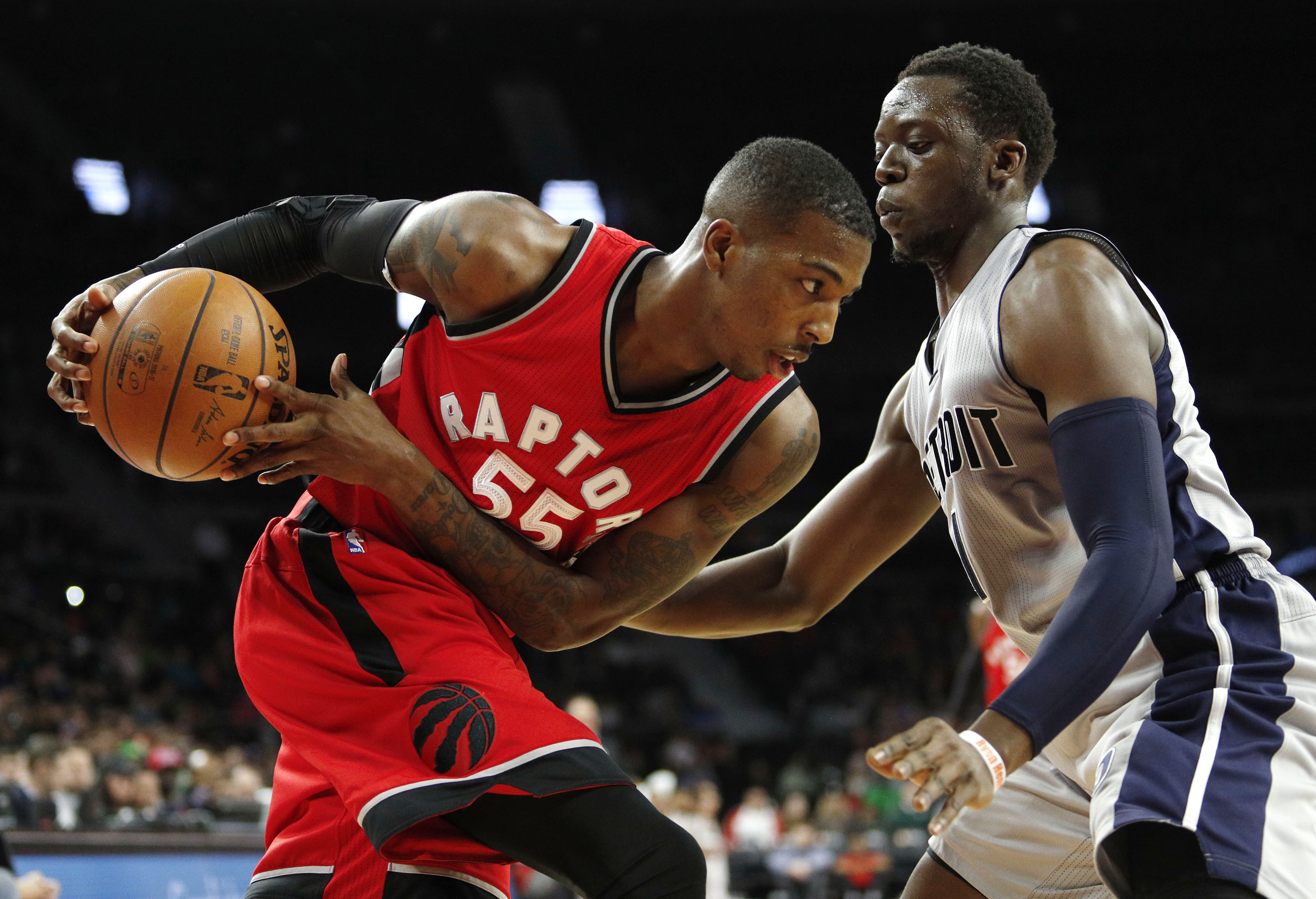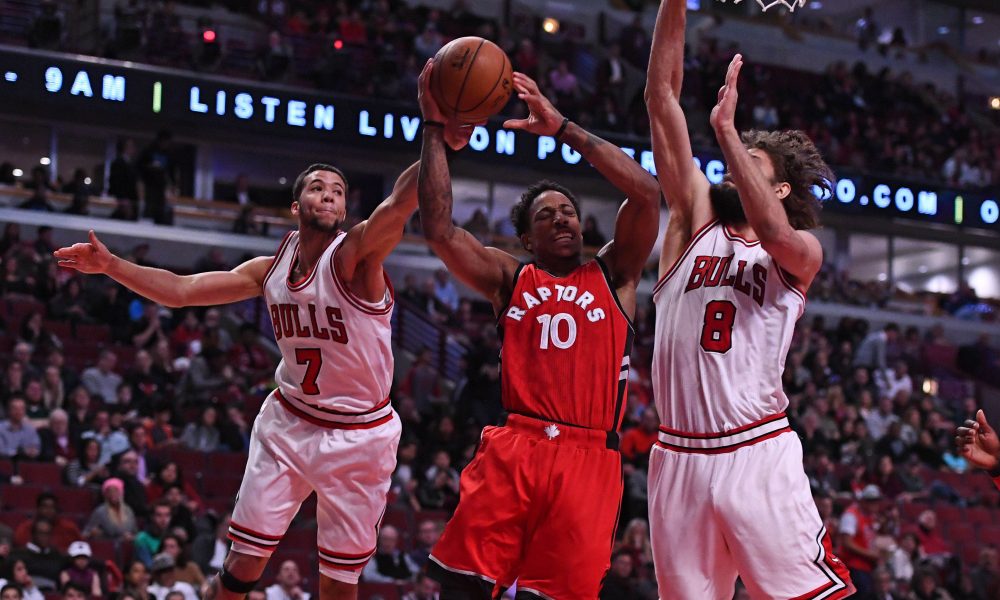The Raptors’ present is a grind – almost every win is a tight affair in which several things have to break right. Grinds are fun, but only in moderation. In that spirit, it might be worthwhile for fans’ mental health to project some positivity into the future. Delon Wright has emerged as a capable guard for the Raptors’ present in this stretch run without Kyle Lowry, and his future is far more intriguing than his present. Let’s look at what Wright brings to the table today and try to project that into his future as a potential building block.
Quick note: Instead of saying it in every section, I’ll just say this once before I begin: Small sample sizes! Wright has not played enough minutes in the NBA for his career stats to have stabilized, let alone his minutes this season, which is what we’re going off of. While his stats have noise, they can still project his future when combined with analyzing the visuals of his play. Stats are taken from nba.com, basketballreference.com, and espn.com. All statistics are current as of March 18th, 2017.
Defense
Wright was touted as a defense-first guard, so let’s make this a defense-first column. First and foremost, Wright is long, standing at a measured 6’5 with shoes with a 6’7 wingspan (per his draft combine measurements). He uses this length to make himself useful off-ball on the defensive end, piling up deflections at a gargantuan rate. Robert Covington leads the league in deflections per game, at 4.2. Wright collects an impressive 2.7 deflections per game, which is all the more amazing at his 16.0 minutes. In fact, in deflections per minute, he tops Covington by a small margin. Some of these deflections come in minor, offense-delaying tips out of bounds, and some come in major, offense-destroying come from behind blocks:
Wright can use his length to envelope opposing guards when he is on-ball. He can stay chest-to-chest with every move jitterbugs throw at him, using his length to contest (or swallow) their final attempts:
His on-ball skills are tantalizing, but inconsistent, as you’d expect for a young player. Opponents shoot a higher field goal percentage when guarded by him, which is a trait quite common to young, athletic guards. The defensive IQ will come, and the skills are already there. His off-ball skills are impressive, and he accordingly has a tidy 94.9 defensive rating on the season. His defensive real plus minus is similarly strong, at +0.86 on the season, which is good for sixth among point guards.
Wright’s defense should only improve, especially as he adds some strength and weight to his thin frame as he ages. Defensively, he projects as a George Hill type, who locks down opposing guards and wings with his impressive quickness, length, and strength. This would be an incredible outcome – Raptors fans know the defensive prowess of Hill all too well.
Offense
Wright’s offensive development lags behind his defense, but there are still positive nuggets to be gleaned. Wright neither creates great separation with his dribble, nor is he a great shooter. A quick look at his field goal percentage reveals his relatively inefficient offense as a result of those restrictions.
| Field Goal Percentage | League Average FG% | |
| Field goals | 41.3 | 45.6 |
| 3 point field goals | 31.3 | 35.8 |
Wright has fewer tools in his arsenal than the best guards, though he is young, with fewer reps at the NBA level than others his age. He isn’t an explosive athlete. Wright’s drives are hindered by his inability to create separation with his dribble:
He can become a capable finisher, but that lofting floater over a big is an inefficient shot for Wright – the Raptors’ offense can do better. His field goal percentage on drives is a measly 43.8%, which is near the bottom of the league for guards with more than five drives a game. However, his best finishing is accompanied by a change in hands near the rim or a change in pace before shooting. Wright shows a sneaky ability to create separation with Nash-style, herky-jerky moves before his shot:
He is at his best changing speeds and direction, and that craftiness should come with reps. He already has a high-level reverse layup in his bag, which is his best finishing move.
Wright’s drives are bolstered by great foot control and an impressive vision over the defense, which is aided by his height:
That play is started with a slip-screen with Wright screening for DeMar DeRozan. This was recently popularized by Steph Curry screening for other Warriors, and the Raptors create incredibly efficient shots when Lowry slips screens for his teammates. Here, Wright does the same, but his handicaps as a shooter force him to drive while the defense is rotating. He does a tidy Eurostep – probably his favourite move as a driver – around Markieff Morris, and finds little daylight. His size allows him to whip a pass to Norman Powell, who does the rest.
Wright’s passing on drives is one of his most likable qualities on offense, though he can take that tendency too far to the extreme. In fact, he passes on 44.3 % of his drives, which is a whopping number. Only 7.6% of those passes lead to assists, which is poor. The best guards, like James Harden and Chris Paul, assist on 15-20% of their passes out of drives. Wright has trouble reading rotations in real-time, especially as he is blazing through the lane at full speed. His passes can arrive late, above his teammates’ heads, or below their waists, which effectively drops their shooting chances to nil even if they were open initially. These mistakes will filter out of Wright’s game as he ages and gets experience. He has vision and a high passing IQ – the rest will come with time.
As a shooter, Wright is disrespected by opposing defenses. They go waaaay under screens and dare Wright to beat them. He can occasionally do that:
His shot looks fine, but it has some unnecessary motion. If he cleans up his release (again, more reps), he should be able to become at least a league-average shooter. His shot is far from broken, and the more willingness he shows to shoot, the more it will help the offense. However, there is a potential caveat: If Wright can’t become a league average shooter, he mucks up an offense so much that he becomes almost unplayable on that end. He offers some positives, but not enough to make up for a guard that can’t shoot. His offensive rating is sour, and he will only hurt the Raptors’ offense until he is able to can some jumpers. I think that will come.
If Wright is able to improve as a shooter, he projects as a Patrick Beverly-type. Beverly can hit an open jumper and move the ball on drives. He helps the high-powered Houston offense. If Wright can’t improve as a shooter, his ceiling is comparable to that of Michael Carter-Williams(MCW can’t shoot, but in terms of overall quality).
Conclusion
Wright is a talented prospect who is already earning minutes for a playoff team. That cannot be overstated. Some of the Raptors’ best lineups since the all-star break (coinciding with Lowry’s injury) involve Wright, and he has been key in several huge wins.
On the defensive end, he already helps the team a large amount. On offense, he shows glimpses of ability, but his overall production trails the skills, for now. Taken together, his net rating is a solid 5.4 and his real plus-minus is a middle of the road -0.69, good for 29th in the league among point guards (sandwiched by Devin Harris and Shabazz Napier). He is already a league-average point guard, which probably makes him the best third-string point guard in the league.
Projecting Wright in the future is a fun exercise. Most of his negative qualities are ones that are solved simply by aging or playing more time in the NBA, such as decision-making, strength, or pass timing. A great comparison for Wright is Beverly. Wright is longer and taller on defense, but he shows less bulldog-style ferocity. Their defensive metrics are close, though Beverly adds a little more. On offense, Beverly shows an ability to drive-and-kick. He keeps the ball moving on a high-powered offense. Wright already does this and will improve at it. If he can improve as a shooter, he could become an even more useful offensive cog than Beverly.
Wright is young and full of promise, and watching him improve game to game is one of the most enjoyable parts of being a Raptors fan. He can become a useful starter on an NBA team, and his skills are in demand around the league. Daydreaming is fun, and let’s hope watching Wright develop is even more fun.



